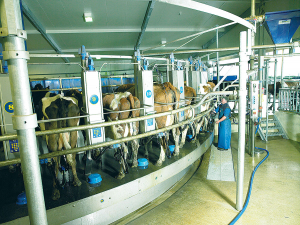Battle for milk
OPINION: Fonterra may be on the verge of selling its consumer business in New Zealand, but the co-operative is not keen on giving any ground to its competitors in the country.
 Dairy farmers are expected to continue to milk as long as they can to capitalise on a record milk price this season.
Dairy farmers are expected to continue to milk as long as they can to capitalise on a record milk price this season.
Dairy farmers will be milking cows for as long as they can to capitalise on a record milk price this season.
Soaring farm input costs may erode profit margins, but a milk price near $9/kgMS provides farmers the chance to boost income and reduce debt.
Fonterra chief executive Miles Hurrell says farmers around the globe are facing inflationary pressures and NZ is no exception.
"But I don't think there will be any adverse reaction to milk production," says Hurrell.
Hurrell points out that the co-operative's milk supply is down around 3% on this time last season.
However, improving weather conditions and forecast milk collections for the balance of this season are generally on par with last season.
Fonterra expects to collect 1,525 million kgMS this season, just shy of the 1,539 million kgMS collected last season.
Former Waikato Federated Farmers president Andrew McGiven agrees that if the current payout forecasts hold true, rising input costs will not affect milk production too much.
McGiven believes farmers will instead be keeping a close eye on the weather. "If it gets too dry over summer, farmers will continue to monitor rising feed input costs, along with cow condition to determing what will be their cut-off pint for milking," he told Rural News.
"Most I think will continue to milk for as long as possible to capitalise on the payout."
While feed, fertiliser and fuel prices are rising, McGiven believes the biggest concern for farmers will be the rebound in interest rates.
“That may have a significant impact on some farm’s profitability.
“Inflation is the profit stealer from any business and we are seeing this also on most products and inputs, from diesel and petrol through to wages and fertilisers.
“At the moment we are lucky to have a good forecast milk price to buffer us from most of these impacts.
“I am trying to pay down as much debt as possible, also being well aware that we will have another potentially large tax bill looming in the next financial year that we also need to budget for, so I am certainly hoping that these type of milk prices can be sustainable in the short to medium term.”
Earlier this month, Fonterra narrowed its forecast milk price range to $8.40 - $9/kgMS, with a midpoint of $8.70/ kgMS.
Updating its milk collection figures, the cooperative says season to date collection, June – October, was 510.9 million kgMS, 3.2% behind last season.
“Cold and wet spring with limited sunshine affected pasture growth and collections early in the season,” Fonterra said. “Full season forecast remains at 1,525 million kgMS, down 0.9% on last season – improving weather conditions and balance of this season’s collections being on par with last season supports current forecast.”
Global demand for dairy remains strong and Fonterra thinks that will remain the case for the short to medium term.
At the same, the cloud of Covid-19 and new emerging variants cast a shadow over global trade.
Hurrell says the co-op is working hard to deliver for farmers, unit holders and customers and supporting employees.
“The resilience of our people and our supply chain means we continue to stay on top of the strong demand for our New Zealand milk,” he says.
“However, it is concerning to hear about new variants, which are potentially more resistant to vaccines. There is also the ongoing question of whether economies can rebound from the pandemic and then sustain their financial health.”
Hurrell says that explains why the co-op has a 60-cent range on its forecast farmgate milk price range.
Tickets are now available for Beef + Lamb New Zealand’s (B+LNZ) Out the Gate, returning from 19-21 May 2026 at Te Pae, Christchurch.
Dairy Women's Network (DWN) is welcoming AgriHealth as a new partner.
Northland Field Days patron Ross Newlove remembers the inaugural field days he attended 40 years ago.
Southland farmer Murray Donald has been appointed as chair of Safer Farms, the industry-led organisation focused on reducing harm, injuries and fatalities in the agricultural sector.
National Lamb Day returns this Sunday, 15 February, with Beef + Lamb New Zealand Inc calling on Kiwis to fire up their barbecues and celebrate the people and the product that put New Zealand on the world map.
When it comes to arranging the sound system at Northland Field Days, no one does it better than Colin Finlayson.

OPINION: Here w go: the election date is set for November 7 and the politicians are out of the gate…
OPINION: ECan data was released a few days ago showing Canterbury farmers have made “giant strides on environmental performance”.